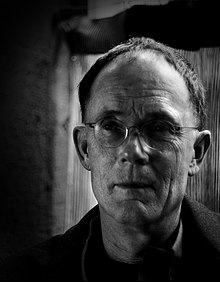
William Gibson is an American-Canadian writer who has been called the "noir prophet" of the cyberpunk subgenre of science fiction.[1] Since first being published in the late 1970s, Gibson has written more than twenty short stories and nine critically acclaimed novels. His early works are bleak, noir near-future stories about the relationship between humans and technology – a "combination of lowlife and high tech".[2] Several of these garnered critical attention and popular acclaim, receiving Hugo and Nebula Awards nominations in the categories of best short story and best novelette and being featured prominently in the annual Locus Awards reader's poll.
The themes, settings and characters developed in these stories culminated in his first novel, Neuromancer (1984), which proved to be the author's breakout work, achieving critical and commercial success and virtually initiating the cyberpunk literary genre.[3] It became the first novel to win the "triple crown"[3] of science fiction awards – the Nebula and the Hugo Awards for best novel along with the Philip K. Dick Award for paperback original,[4] an unprecedented achievement described by the Mail & Guardian as "the sci-fi writer's version of winning the Goncourt, Booker and Pulitzer prizes in the same year".[5] It also won the Ditmar and Seiun awards, received nominations for the year's "outstanding work" Prix Aurora Award and the British Science Fiction Association (BSFA) award for best novel, topped the annual Science Fiction Chronicle poll and finishing third in the standings for the 1985 John W. Campbell Award.
Much of Gibson's reputation remained associated with Neuromancer,[6] and though its sequels in the Sprawl trilogy – Count Zero (1986) and Mona Lisa Overdrive (1988) – also attracted Hugo and Nebula nominations for best novel, major award wins eluded the writer thereafter. "The Winter Market", a short story first published in November 1985, was well-received, garnering Hugo, Nebula, Aurora, and BSFA nominations and finished highly in the Locus, Interzone and Science Fiction Chronicle polls. Having completed the cyberpunk Sprawl trilogy, Gibson became a central figure in the steampunk subgenre by co-authoring the 1990 alternate history novel The Difference Engine, which was nominated for the Nebula, Campbell, Aurora and BSFA awards and featured in the Locus poll. His most recent novels – Pattern Recognition (2003) and Spook Country (2007) – put his work onto mainstream bestseller lists for the first time,[7] and the former was the first of Gibson's novels to be shortlisted for the Arthur C. Clarke Award. Gibson was inducted into the Science Fiction Hall of Fame in 2008.
- ^ Cite error: The named reference
smhwas invoked but never defined (see the help page). - ^ Cite error: The named reference
maowas invoked but never defined (see the help page). - ^ a b Cite error: The named reference
mccafferywas invoked but never defined (see the help page). - ^ Cite error: The named reference
lrcwas invoked but never defined (see the help page). - ^ Cite error: The named reference
electrosteroidswas invoked but never defined (see the help page). - ^ Cite error: The named reference
spikewas invoked but never defined (see the help page). - ^ Cite error: The named reference
hirstwas invoked but never defined (see the help page).
